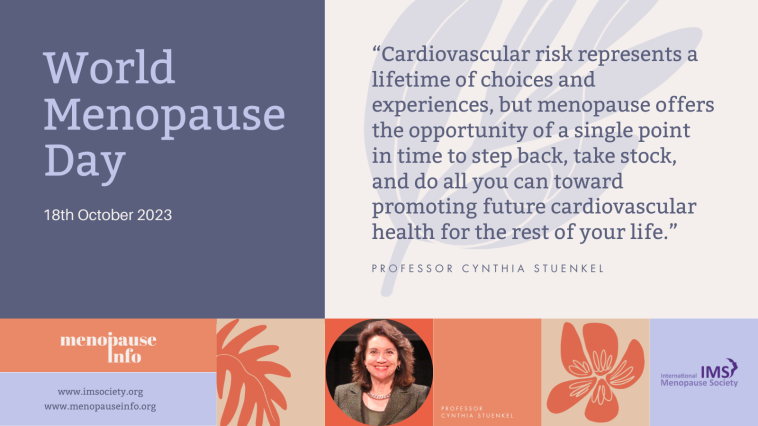World Menopause Day 2023
World Menopause Day is held each year on 18 October to raise awareness, break the stigma and share support available for improving health and wellbeing for those experiencing menopause. The theme for this year is Cardiovascular Disease, which is the highest cause of mortality for women worldwide.

The menopause is a natural event in a woman’s life that typically takes place between 45 and 55 years of age, as oestrogen levels decline. Menopause is a normal part of ageing, and should not be viewed as a disease. For some women it can even be a positive experience. However, for many it can have a significant negative impact on their health.
The impact of menopause on cardiovascular disease
If menopause happens at a particularly early age (i.e. below the age of 45) or at an age that is considered premature (i.e. below the age of 40), this can speed up the possible development of cardiovascular disease. However, menopause at the average age of 51 may lead to a heightened risk of developing the disease. Unless there is a good reason not to, the use of menopausal hormone therapy, particularly for women with premature and early menopause, is recommended to reduce the risks of heart disease.
“Cardiovascular risk represents a lifetime of choices and experiences, but menopause offers the opportunity of a single point in time to step back, take stock, and do all you can toward promoting future cardiovascular health for the rest of your life.”
- Professor Cynthia Stuenkel
Researchers have recently discovered that a woman’s reproductive experiences throughout her life (including menstruation, pregnancy, any breast cancer treatments, and menopause) can affect her chances of developing affect their chances of developing cardiovascular disease later in life.
Read more about the causes of cardiovascular disease and steps to take reduce risks
Women’s health after menopause
Well-known menopausal symptoms include hot flushes, night sweats, discomfort during sex, difficulty sleeping, low mood, and memory problems. However recent research points to links between menopause and a wider range of health issues. In addition to supporting women through the experience itself, the menopause gives health providers an opportunity to assess a woman’s health as she enters another stage of her life. Population projections suggest that by 2050 there will be 1.5 billion people who are over 65 in the world, compared with 531 million in 2010. At least half of these will be women.
As well as age-related illnesses such as osteoporosis, older women experience sexual and reproductive health issues beyond the menopause. For example, the health effects of repeated pregnancies and complications like fistulae or pelvic organ prolapse can be long lasting, or appear some years later.
Older women may also be at risk of health problems arising from violence, neglect, or poverty, often experiencing compound discrimination because of their age and their gender.
Older women ‘invisible’
Poor health not only causes suffering and damages the quality of life of individual women but has a knock-on effect, as older women in many communities play a vital role as midwives and carers and hold valuable knowledge about agriculture and household management. However this social and economic contribution is often overlooked because their labour is unpaid.
The severity of these issues can be disguised by data systems which fail to collect information on women over the age of 49, rendering older women and their needs invisible when programmes and services are being designed.
Older women’s voices must be heard and their health needs discussed as part of a life-cycle approach to healthcare which recognises the dignity and rights of women at every age.